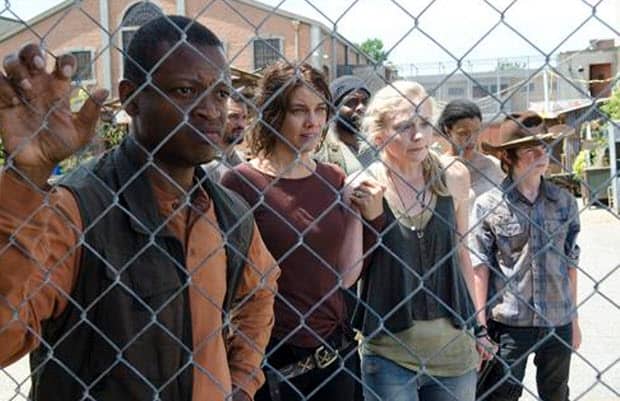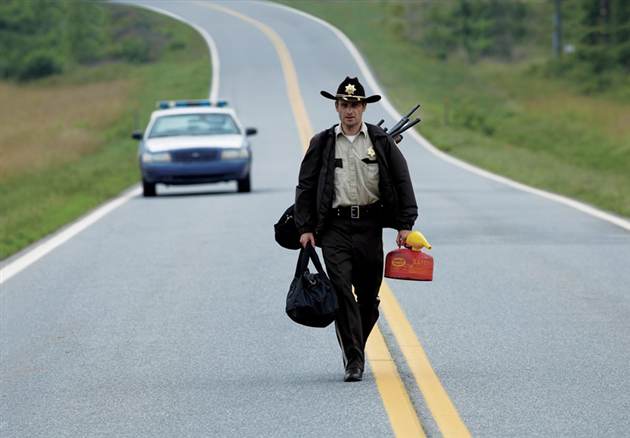
For seasons, The Walking Dead has struggled with longer narrative arcs: the show’s been at its best telling smaller, contained stories, like the introduction of Woodbury, the return of Morgan Jones — or in recent days, Carol and Rick’s supply run. When it comes to the larger, overarching stories (the farm, Rick and Lori, The Governor), The Walking Dead‘s relatively thin characterizations and themes are stretched beyond their limits, often leading to repetitive storytelling (Where’s Carl?, which made an ironically hilarious return tonight) and head-scratching logic.
Being the culmination of a 24-episode arc, it’s no surprise that the Governor’s Last Stand is more of a visual spectacle than an emotionally resonant hour, even with the death of a couple ‘major’ (it’s debatable how major any of these three were, but I digress) characters on the show. The biggest problem is the logic behind it all: how does the Governor ever think this plan is going to succeed? It’s obvious his entire speech to the community was a series of lies — completing his arc from psychopath to broken man and back, paralleling his equally malicious and misleading final Woodbury speech nicely — but it’s not clear what his endgame is. Yes, his desire for revenge ultimately outweighs his loyalty to “family” (again… we saw this happen last season) — but what does he think he can accomplish by destroying the prison?
There’s never really any attempt to justify it: we’re just given the same lies as the rest of his voluntary militia, a group of faceless characters who serve their purpose as Meat Lemmings perfectly (seriously: not a single person said no to ambushing a camp of people, even violent ones?), running into battle without ever considering the obvious logical fallacies of the Governor’s plan — that is, attacking a group of people and forcing them out (either alive or dead) isn’t going to make their lives easier at all, just more dangerous and bloody. We just have to accept that a group of untrained, mostly inexperienced people (remember, the Governor was really the only one capable of killing a zombie efficiently, even though everyone else had survived as long as him)are suddenly ready to become kamikaze soldiers, able to organize in formation behind tanks and shoot a ton of bullets inefficiently at everyone.
But alas, the battle for the prison commences once Rick’s pride comes head-to-head with the Governor’s (as it did in last season’s “Arrow on the Doorpost”), and we’re treated to the gratuitous image of the Governor rallying his troops and showing how “serious” he was by burying Michonne’s katana into the side of Herschel’s neck. We all knew the old man wouldn’t live forever in this world (even if he did somehow find a magical cure for a missing foot; that guy hasn’t limped or used a crutch in weeks), but the episode at least treats his death with some meaning, ending his life just as he recognizes his influence on Rick has finally reached him, watching Rick try to reach out and negotiate, instead of refusing to protect or help anybody but those he calls his own.
Which brings me to the second logical black hole “Too Far Gone” falls into to justify the bullet-riddled events of the final twenty minutes: when did Rick become such a willing negotiator? If anything, season four’s tried to paint Rick in a darker light, a man unwilling to compromise the safety of himself or his family (the one solid parallel between him and the Governor season three was able to produce) for anyone, especially those who think they hold the key to all the answers (Carol, which Daryl is pretttty upset about).
This little twist of character is jarring in the scene — just as it jarring when Rick abruptly changes his tone and lets the Governor know just how willing they are to take on a tank (despite all the sickness going around, courtesy of the dead, zombie-eaten rats Tyreese finds in the dark corner of the prison) to protect the home they’ve built — ignoring the fact the tank’s already blown off the ever-important crow’s nest, eliminating their ability to gain a vantage point on any opponent. There really isn’t a reason given for Rick’s sudden defiance (except that the situation doesn’t really give him time to consider any options) — but once that goofy grin comes across Herschel’s face, it really doesn’t matter.
What follows is what we’ve expected to happen since the middle of season three, and really thought would happen at the end of season three: the Governor and Rick have a final fistfight, Michonne buries her sword in the Governor’s chest (instead of a pick in his eyeball, she picks a more lethal spot), and everything goes to hell at the prison. Save for a few token sequences (Daryl taking out the tank, Tyreese seeing the culmination of Lizzie’s weirdness and Carol’s lessons), the sequences are mostly incoherent, jumping from close-up to close-up without a lot of establishing shots to determine who is firing at what and where. The editing tries to do a lot of the work (cutting from close-ups of the prison members immediately to the Governor’s group falling down), but without pausing to re-establish the landscape and positions of the ever-moving characters, it’s a lot of loud noises, whizzing bullets, and people in downtrodden clothes ducking behind stuff.
Is it dramatic? Certainly: there are moments in “Too Far Gone” that harken back to the season premiere, turning The Walking Dead into a sprinting, kinetic action film (as it did with the “raining zombies” sequence), rather than the plodding drama it exists as the other 85% of its time on screen (plus there’s a lot of Daryl doing awesome Daryl stuff, which is half the reason we tune in anyway, right?). It’s loud and doesn’t make a lot of sense, but there’s nothing like the smell of imminent death in the air to give a shot of adrenaline to a stalling narrative, and that’s exactly what “Too Far Gone” does — in that sense, it’s as successful as any of the series’ culminating events, splintering the primary characters of the prison group up in a way the series has never attempted before.
Where does The Walking Dead go from here? Finally out of the shadow of The Governor, there are a lot of avenues for TWD to take when it returns in the spring: dealing with the death of Herschel and Judith (who’s gotta be dead; there’s a lot of blood in that baby seat) could finally give some much-needed texture to Rick’s tortured character — or it could lead to a lot of Rick Grimes staring at stuff and locking his jaw up to show just how riddled with emotions he is inside. Maggie and Beth are now separated, Bob’s been shot, Lizzie’s leading a group of rogue children around… if anything, the events of “Too Far Gone” throw a lot of potential plot points in the air, a series of disconnected survival stories that could bring the show in a lot of new directions in the spring. Like I said, The Walking Dead works better when its a ‘smaller’ show: with the Governor and the prison finally behind us, maybe 2014 will bring more of the contained, character-focused stories that don’t rely on goofy logic or numerous plot machinations to execute. Like the survivors of last night’s attack, we can always have hope.
Other thoughts/observations:
– The Walking Dead reviews will return February 9th, with an as-of-yet-untitled script from Robert Kirkman.
– One thing I really, really enjoyed in “Too Far Gone”: where most of the men (Rick, Daryl, Tyreese) find themselves relatively unprepared for things to go sideways (therefore causing them to be reactive), the women of TWD (Maggie, Beth, even a few of the Governor’s people) were much more proactive, executing plans and taking charge while the men flailed around. Really enjoyed that little bit of gender reversal (whether intentional or not, I don’t care — still good to see).
– “We’re not killing people, we’re killing killers” is not really that convincing of an argument; neither is “there are biting pits, so we gotta go kill these people.” Can’t believe nobody called him out on that BS!
– Let’s all let out a groan for the “love” arc of Lilly and the Governor: he tells her he loves her (c’mon), she ends him with a bullet to the head (after he’s already been ‘killed’, rendering it pointless).
– Meghan dies — but it’s not the Governor’s fault, it’s her crappy mother who stops paying attention long enough for a submerged biter to gnaw on her through the sand (which by the way, a nice little visual touch).
– Rick, to the Governor: “We can still come back.”
[Photo via Gene Page/AMC]
 Follow Us
Follow Us




